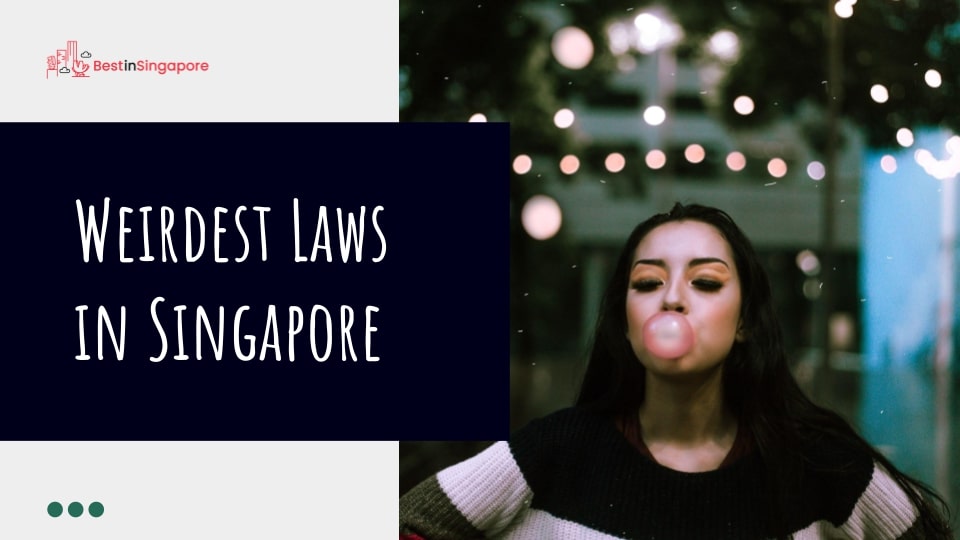25 Weirdest Laws in SG
Singapore isn’t called “The Fine City” for nothing. And while some say fines are the literal price to pay for being in a country with a low crime rate, others tend to think of them as a bit too much.
To see the reasons behind the country’s so-called weirdest laws, one needs to understand the Singapore legal system. And that’s what today’s post aims to do.
Why are there strict rules in Singapore?
Prohibitions and punishments are behind a lot of what people think are the weirdest laws in Singapore. Still, others could argue that they’re directly responsible for Singapore becoming a first-world country.
Singapore’s single-minded focus on being a clean, orderly, and safe nation has given birth to these stringent rules and regulations. And to ensure that they’re properly implemented, harsh punishments and stiff fines are part and parcel of them.
In this article, we’ll be taking a closer look at some of the weirdest laws (and their penalties) in Singapore concerning
- Hygiene and cleanliness
- Modesty and decency
- Creative and gender expression
- Specific animals and produce
- Public gatherings and behaviours
Weirdest Laws on Hygiene
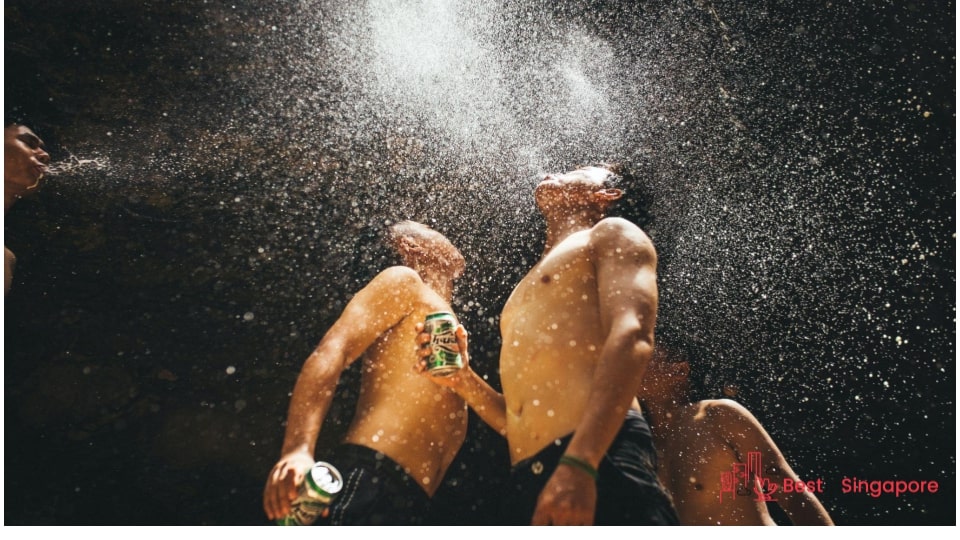
Judging by how clean and neat Singapore is, you might wonder if daily professional cleaning services are keeping it that way.
But both personal and public hygiene are much valued in the country, which is why you’ll find some strange laws aiming to keep everything hygienic and sanitary.
1. It’s mandatory to flush public toilets
Specific law: The Environmental Public Health Act Chapter 95, Section 113
Penalty or fine: S$150 to S$500
To everyone who’s been taught to flush the toilet after using it since they were toddlers, this law might appear exaggerated. But anyone who’s ever had to use a public loo after someone wrought havoc on it might agree on why this is necessary.
Mandatory flushing is part of Singapore’s Environmental Public Health Act. In particular, it states that
“Any person who has urinated or defecated in any sanitary convenience with a flushing system to which the public has access shall flush the sanitary convenience immediately after using it.”
And yes, there are random spot checks by officials to see if someone has properly flushed a toilet after using it!
So if you want to avoid paying anywhere between S$150 and S$500, make sure everything’s spotless before you leave your cubicle.
2. You can’t urinate inside elevators
Specific law: The Environmental Public Health Act Chapter 95, Section 113
Penalty or fine: S$1,000
You might ask yourself if there’s anyone who pees inside an elevator. But if you’re an employee stuck in the lift of a tall office building with a full bladder, this scenario might not be so farfetched.
And it’s not something you can do discreetly either. Most elevators in Singapore are built to detect the presence of urine, so it’s just a matter of finding out who did it (and when).
This law applies not just to elevators but to other public places in Singapore as well. The Environmental Public Health Act provision for it goes
“No person shall urinate or defecate in or upon any street, arcade, vacant land, river, canal, ditch, drain or watercourse or in any place to which the public has access except in any sanitary convenience provided for such purpose.”
3. Spitting or expelling snot in public isn’t allowed
Specific law: The Environmental Public Health Act Chapter 95, Section 113
Penalty or fine: S$300 to S$1,000
The same public health act also prohibits spitting or snotting in public places. In fact, it’s one of the most important things not to do in Singapore in case you’re planning to visit.
Specifically, the law says,
“No person shall spit, or expel mucous from the nose, upon or onto any street or upon or onto the floor or other part of a public service vehicle, a place of public resort or any place to which the public has access.”
So if you don’t want to be S$300 or even S$1,000 poorer because of sticky phlegm or a runny nose, don’t forget to bring some tissue paper or a hanky with you at all times.
4. Littering is punishable by law
Specific law: The Environmental Public Health Act Chapter 95, Section 113
Penalty or fine: S$300 to S$5,000 and community service
Singapore has efficient disposal services, so there’s no reason to throw garbage around willy-nilly. But just in case you’re tempted to, read (and heed) these words:
“No person shall throw or deposit, or cause or permit to be thrown or deposited, any dust, dirt, ashes, refuse, offal, rubbish or other matter or thing from or out of the first floor and upwards of any building to the street, courtyard or ground below.”
This is just one in a long list of prohibited activities to keep Singapore spotlessly clean.
Repeat offenders would have to pay up to S$5,000 aside from doing community services and wearing a sign that says they were caught littering (oh, the shame)!
5. Absolutely no chewing gum is allowed anywhere
Specific law: Regulation of Imports and Exports Act, Chapter 272A, Section 3
Penalty or fine: S$100,000 or two years in jail
Chewing gum is banned in Singapore for several reasons. When it was still legal, chewed-up gum became the main culprit for train doors not opening properly and people accidentally sitting on them on public transport seats.
In short, chewing gum is gross, sticky, and messy and doesn’t have a place in an orderly and clean society. At least, that’s what Singapore thinks so.
In fact, both the Regulation of Imports and Exports Act and the Sale of Food Act mention how chewing gum shouldn’t even be brought into the country (much less chewed and spat in it).
It’s such a seriously taken law that breaking it will result in either a S$100,00 fine or two years in prison.
Weirdest Laws on Modesty and Decency

Since Singapore is a tropical country, you might be planning your vacation wardrobe around the weather and humidity. Cool, comfortable clothing is always a great idea.
But beyond the clothes you’ll wear, it’s good to be mindful of your modesty during your visit so you won’t break any laws.
6. Walking around naked in your own home is prohibited
Specific law: Miscellaneous Offences (Public Order and Nuisance) Act 1906
Penalty or fine: S$2,000 or up to three months in jail
This particular law has proven to be extra bewildering for people, especially those who love taking showers all the time. After all, how can you avoid being undressed in the privacy of your own home?
Being naked in your own home is perceived as a form of pornography, which is illegal in Singapore (more on this in a bit).
And since most homes in Singapore are right next to each other, the chances of your neighbours seeing you in the buff is pretty high. To avoid this scenario, keep a bathrobe ready and always draw your curtains whenever you need to undress.
7. Hugging without consent isn’t allowed
Specific law: Protection from Harassment Act 2014
Penalty or fine: Undisclosed
If you’re a touchy-feely friendly type, you might have a bit of trouble with this particular law. And no, good intentions behind hugging won’t cut it if the recipient hasn’t given express content for the embrace.
Hugging and holding hands between lovers during a date in Singapore is fine but not between strangers or even casual acquaintances. To avoid the awkwardness (and potential fines), simply nod or extend a hand to shake for the other person instead.
Still, if there’s anything this law healthily encourages, it’s to always ask for consent first about anything concerning other people.
8. Adult films and publications are banned
Specific law: Undesirable Publications Act 1967
Penalty or fine: S$10,000 or two years in jail
Forget about downloading that steamy novel in your eBook reader. Singapore’s Undesirable Publications Act prohibits it, along with possessing, reading, or viewing other raunchy material.
The government has classified these things as obscene. And anyone caught breaking this rule can be jailed anywhere from three months to two years.
Depending on the gravity of the situation, a fine amounting to thousands of Singapore dollars can also be imposed. To prevent this from happening, better confine your reading to wholesome genres instead.
Specific law: Undesirable Publications Act 1967
Penalty or fine: S$2,000 or two years in jail
You also can’t keep any form of pornographic material, whether it’s on your laptop computer or any other device. It’s also part of the Undesirable Publications Act of 1967.
The specific offences for this law go
“Any person who without reasonable excuse has in his possession any prohibited publication or any extract therefrom shall be guilty of an offence and shall be liable on conviction for a first offence to a fine not exceeding $2,000 or to imprisonment for a term not exceeding 12 months or to both, and for a subsequent offence to imprisonment for a term not exceeding 2 years.”
So steer clear of publications, videos, films, songs, and other forms of explicit content or pornography to be safe. And don’t even think about re-recording, distributing, or selling them if you don’t want long-term imprisonment or thousands of dollars in fines.
Weirdest Laws on Creative Expression
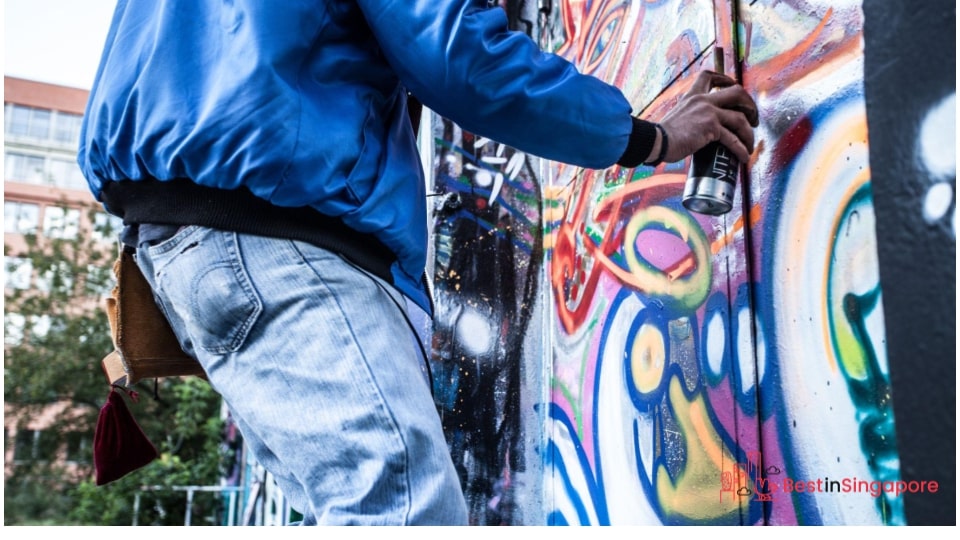
Singapore offers a lot of activities for artistic people, but random graffiti and leaving marks on public property aren’t part of them.
Looking around at all the architecture, landscaping, and other unique infrastructure of Singapore makes it difficult to imagine that certain creative expressions aren’t allowed.
Let’s take a closer look at some of them.
10. You can’t set off fireworks if it isn’t an official festival
Specific law: Dangerous Fireworks Act 1972
Penalty or fine: Up to S$5,000 or two years in jail
You can get your fill of some of the most awe-inspiring and colourful fireworks during the Chinese New Year festivals and other events in Singapore. However, it’s prohibited to light up firecrackers as a personal recreational activity.
Under the 1972 Dangerous Fireworks Act, any person found setting off or in possession of any form of fireworks can be charged up to S$5,000, or spend two years in jail.
Fireworks and firecrackers are strictly reserved for official festivals and holidays such as Singapore’s National Day celebrations. This means ordinary birthdays, anniversaries, and other unofficial occasions can’t have their own pyrotechnic displays.
11. You can’t play a musical instrument in public that others might find “annoying”
Specific law: Public Order 2009
Penalty or fine: S$1,000
There are plenty of great live music venues in Singapore with talented musicians and performing artists for your entertainment. But those “musicians” found in public places who are more annoying than entertaining are actually breaking the law.
So unless that person (or group) has mastered playing the guitar or violin and generously shares their talent in public, they’ll likely be considered a nuisance.
And this form of annoyance has a steep price attached to it—to the tune of S$1,000, no less! This means practising and perfecting your musical skills at home would be a much better option.
12. Graffiti of any kind isn’t allowed
Specific law: Vandalism Act 1966
Penalty or fine: S$2,000 or up to three years in jail or caning
Singapore has lots of art jamming venues and creative workshops meant to encourage people to express themselves in all forms of visual art. However, spray painting graffiti isn’t considered street art here but vandalism.
The punishment for breaking this particular law is quite humiliating too. As late as 2014, some young male American tourists were threatened with public caning when caught vandalising some public property.
In short, the Vandalism Act of 1966 should be taken seriously. It specifically defines vandalism as
“…writing, drawing, painting, marking or inscribing on any public property or private property any word, slogan, caricature, drawing, mark, symbol or other thing.”
The Act goes on to describe other acts considered offences that are arrestable and non-bailable. The long and short of it is that it’s banned, so avoid graffiti at all costs.
13. Singing a song with questionable lyrics is prohibited
Specific law: Obscene Acts under Penal Code 1871
Penalty or fine: Three months in jail or S$1,000
Do you like singing? Have you memorised most of the National Day songs of Singapore so you can show off both your skills and devotion to the country?
While it’s perfectly fine (and even welcome) to burst into song in public, you should avoid singing something that has rude or swear words in it. The same applies to obscene songs.
And just like the regulation on playing musical instruments that can irritate members of the public, this law can set you back S$1,000 or three months in jail if you break it.
14. You’re not allowed to exhibit gestures or expressions deemed “gay”
Specific law: Outrages on Decency under Penal Code 1871
Penalty or fine: Two years in jail
Same-sex relations between two male individuals can land them in jail for two years. Under the Singapore Penal Code, it’s illegal.
But as of August 2022, the Prime Minister has expressed the intention of decriminalising this. There’s also a possibility of Parliament recognising same-sex marriages and civil unions.
Male homosexuality and expressions associated with it have deterred people from having sensitive positions in government up until the early 2000s.
And servicemen who’ve either outed themselves or by others are required to submit themselves to a psychiatric evaluation—in the presence of their parents!
With Singapore society being so conservative, effeminate or “gay” expressions and gestures are often put under close scrutiny.
However, Singaporean society has been more tolerant of LGBT events lately, as seen by the growing attendance of the annual Pink Dot celebrations.
15. You can’t fly a kite or anything that interferes with air traffic
Specific law: Air Navigation Act Chapter 6, Section 3
Penalty or fine: S$5,000
If kites and drones are part of your picnic essentials, you might want to check first if they won’t be tools that will break the Air Navigation Act.
In some parts of Singapore, kite flying and releasing balloons and drones are strictly prohibited. Some of the restricted areas include the Marina Bay Floating Platform and its surroundings.
Specifically, it’s not allowed to fly kites and drones or hoist balloons from the ground level up to 600 feet above sea level. This is so they won’t distract or interrupt low-flying aircraft rehearsals and for the safety of their pilots.
This is strictly enforced especially during scheduled rehearsal shows for the National Day Parade. To underline its enforcement, repeat offenders can expect to pay up to S$40,000 or be jailed for up to 15 months!
Weirdest Laws Surrounding Animals and Produce
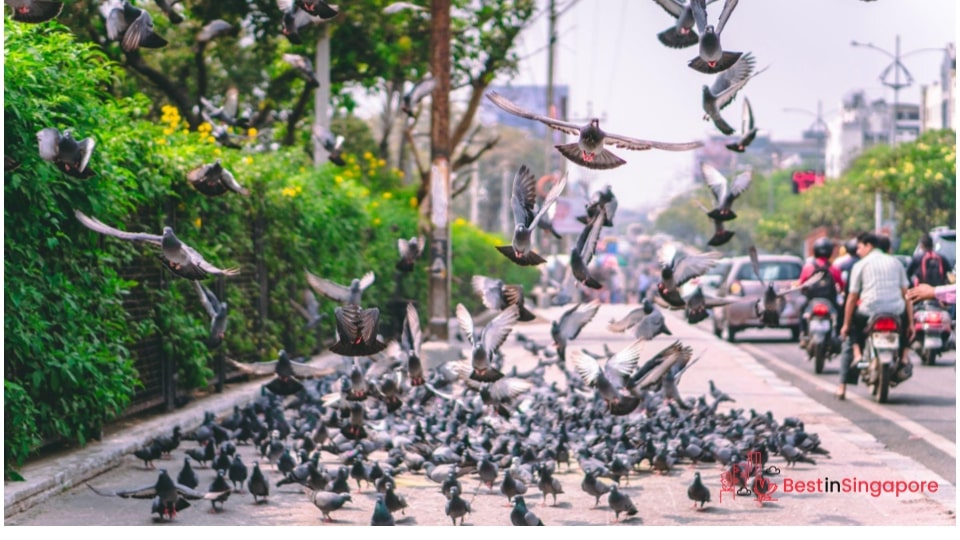
Singapore is a good place to raise happy and healthy pets because of its orderliness and respect for animals. Visiting some of the best zoos in Singapore will further convince you of this.
And yet the country also has weird laws pertaining to certain creatures and even produce. Below are just some of them.
16. Feeding pigeons in Singapore isn’t allowed
Specific law: Animals and Birds Act Chapter 7, Section 70
Penalty or fine: S$500
If you’re like Bert of Sesame Street and your favourite pet is the pigeon, you’ll have to try your darndest to stick to this strange Singapore rule.
To underline how serious this regulation is, you’ll be fined S$500 for dropping a bird even just a crumb. The Control of Pigeons section under the Animals and Birds Act states that
“A licensee shall keep his pigeons in such a place and manner that they do not become a nuisance to his neighbours and members of the public.”
Sadly, even if those cute pigeons look at you with pleading beady eyes, only their licensed owners can feed them, not you.
Feeding pigeons as a knee-jerk reaction in the manner of Mary Poppins won’t cut it here. So the next time you encounter one or even a flock of pigeons, it’s best to keep your breadcrumbs to yourself.
17. Fishing is prohibited
Specific law: Fisheries Act Chapter 111, Section 7
Penalty or fine: Up to $3,000
Planning to bring your favourite fishing rods to Singapore and catch some fresh fish for lunch or dinner? Tough luck because the Fisheries Act prohibits fishing in nearly all the canals and rivers of Singapore.
It prohibits anyone to “loiter, swim or fish within a fishing harbour” and “construct or repair any fishing net or gear on the wharf or any other place in a fishing harbour without the permission of the Director-General”.
Should you choose to ignore these prohibitions, be prepared to pay up to S$3,000 in fines.
The good news is that there are places where you’re allowed to fish legally. But you’re also expected to practise responsible fishing and do catch-and-release whenever you can.
The locations include
- Bedok Reservoir
- Jurong Lake
- Lower Seletar Reservoir
- Lower Pierce Reservoir
- MacRitchie Reservoir
- Marina Reservoir
- Serangoon Reservoir
- Upper Seletar Reservoir
- Pandan Reservoir
- Kranji Reservoir
18. No eating or bringing of durian in public
Specific law: Rapid Transit Systems Regulations
Penalty or fine: S$500
We previously published a post on the food and drinks not to take with durian. But this smelly fruit is also controversially banned in a lot of public places in Singapore, specifically on public transit.
The Rapid Transit Systems Regulations could effectively ban anyone carrying a durian fruit as an olfactory nuisance to other passengers. This regulation carries a stiff S$500 with it, which isn’t worth paying for a taste of the exotic fruit.
Other places like private hotels and resorts might also prohibit clients from bringing in durian in case other customers complain about the smell.
To play it safe, avoid bringing one with you when you need to board a bus, plane, train, or other modes of transport in Singapore.
19. There’s a list of banned dog breeds to be kept in HDB units
Specific law: Housing and Development Act Chapter 129, Section 27
Penalty or fine: Up to S$4,000
Do you live in an HDB flat and want to dog train a pit bull, mastiff, German shepherd, and other big dogs? Sadly, you can’t, as it’s illegal to do so in Singapore.
Only those who live on private properties are allowed to keep and care for larger dog breeds like the ones mentioned above. But fret not because as an HDB dweller, you can still have your pick of dozens of pre-approved dog breeds to keep.
However, you’re only allowed to keep one dog in your HDB flat or risk paying a S$4,000 fine.
20. There’s a long-standing cat ban in HDB flats
Specific law: Housing and Development Act Chapter 129, Section 27
Penalty or fine: Up to S$4,000
Being cat carers, we admit to finding this law particularly heartbreaking. But keeping a feline as a pet in an HDB flat is sadly prohibited, as they are perceived to shed more fur and urinate everywhere.
One big rule under the Housing and Development Act (Animal) Rules prohibits keeping cats and limits the number of dogs in an HDB unit.
It describes how a member of the Housing Board may enter the owner’s premises at any time to ensure that no cats are being kept inside the unit. If caught with one, the owner will be forced to rehome the cat elsewhere (or else pay up to S$4,000 in fines).
Luckily, those who live in condo units and private properties are exempted from this law.
Weirdest Laws about Gatherings and Going out in Public
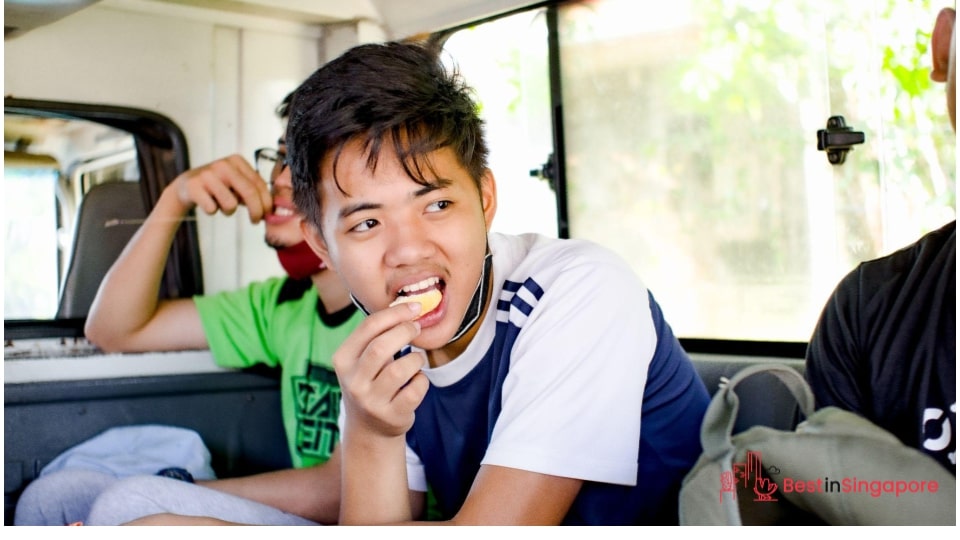
Stepping out in Singapore means enjoying a vibrant, colourful outdoor life, especially when it includes meeting up with friends.
However, care must be taken not to accidentally break any laws while you’re out and about, as there are quite a few of them with really scary punishments!
21. No Public Gatherings past 10 PM
Specific law: Public Order Act 2009
Penalty or fine: Up to S$10,000 or six months in jail
Holding meetings in public past 10 PM is prohibited. This applies to groups of three or more people, which is considered an illegal gathering during that hour.
So basically, holding an “assembly” of even just three individuals in any public place is unlawful, as it’s believed to contribute to the disruption of peace and stability.
What happens if you’re still out with a couple of your pals and it’s suddenly 10 AM? The best advice we can give is to split up and take different modes of transportation home so you won’t be caught outside together.
22. No Public Alcohol Consumption between 10:30 PM to 7 AM
Specific law: Liquor Control Act 2015
Penalty or fine: S$2,000
This particular law might prove to be a downer for those who like frequenting the best bars in Singapore until the wee hours.
In 2015, the government passed a liquor ban between the hours of 10:30 PM and 7 AM with a stiff fine of up to S$2,000 if broken. This means both the sale and consumption of booze are prohibited during those hours.
So yes, that would be a bummer for nocturnal tipplers who like having alcohol be a part of their late-night plans. However, special licenses obtained by restaurants and other places not in the Liquor Control Zones are exempted from this strict law (so, yay?).
23. Connecting to someone else’s Wi-Fi is prohibited
Specific law: Computer Misuse Act 1993
Penalty or fine: S$10,000 or three years in jail
Can’t seem to connect to your portable Wi-Fi, but you simply must go online to check something out? Tough luck because you’re actually not allowed to hook onto unsecured Wi-Fi hotspots in Singapore!
Under the Computer Misuse Act of 1993, connecting to someone else’s Wi-Fi falls under “the unauthorised use or interception of computer service/” The Act goes on to describe this illegal activity as
“intercepts or causes to be intercepted without authority, directly or indirectly, any function of a computer by means of electromagnetic, acoustic, mechanical or other devices.”
The fine for this particular (and seemingly bewildering) law is quite stiff at S$10,000 or three years in jail.
So if you really have to be online, it’s better to use your smartphone’s data despite being tempted to connect to password-less networks.
24. Eating on public transport isn’t allowed
Specific law: Rapid Transit Systems Regulations
Penalty or fine: S$500
We get it. Sometimes, a takeaway burger or pizza smells so good while you’re on your way home that it’s tempting to take a bite just to address the craving.
But if you don’t want to fork over S$500 in fines for a few bites, it’s best to wait until you get home before stuffing your face (grumbling tummy notwithstanding).
The Rapid Transit Systems Regulations specify eating on public transportation as a huge no-no. Similar to the chewing gum ban, it’s to ensure that Singapore’s transportation system remains as efficient and pristine as it could be for passengers.
25. Absolutely no smoking in public
Specific law: Smoking Prohibition in Certain Places Act of 1992
Penalty or fine: S$150 to S$300, or up to $1,000 if convicted in court
While it’s tempting to light up a cigarette, especially after a heavy meal or when you’re feeling stressed, it’s best to refrain from doing so in Singapore.
Unless you’re familiar with all the places where smoking is allowed, you might want to avoid smoking altogether during your stay. It’s safe to assume that smoking is banned practically everywhere in Singapore!
This applies to most public locations and even some private residential areas. And it’s not just traditional cigarettes that are prohibited either.
Cigars, other tobacco products, vapes or e-cigarettes, and even shisha and hookahs are outlawed in the country, too.

